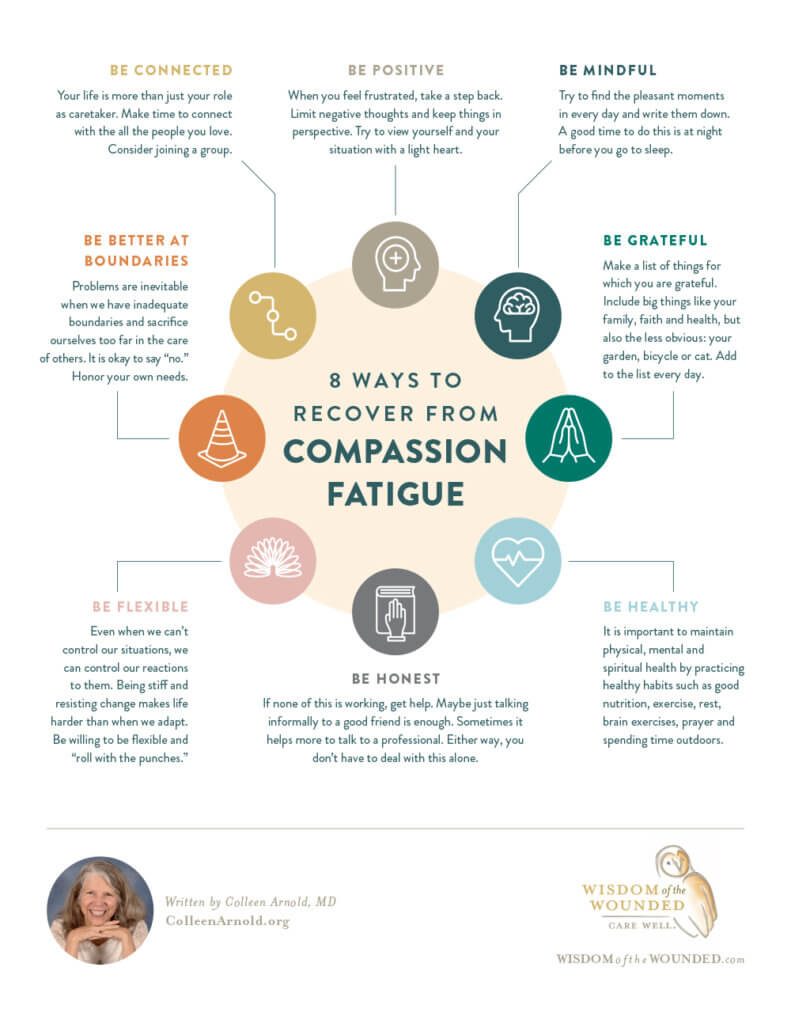By: Colleen Arnold, MD
Are you a fulltime caregiver? Most likely you’ve experienced your share of tiring days. But what happens when you start to become emotionally or physically exhausted by the care you provide? It’s possible that you’ve moved into the territory of compassion fatigue, which is the diminished ability to empathize or feel compassion for others, due to the demands of continual caregiving.
Left unaddressed, compassion fatigue can lead to depression, anxiety, insomnia, and physical ailments like headaches or abdominal pain. In severe cases, it can cause us to neglect or even abuse the people we care for. Especially now, during this Covid 19 pandemic, many of us are overworked. There is too much cleaning and sanitizing, too many sick people at home and in the news. We are all afraid and worried. It’s easy to feel hopeless and ineffective. Fortunately, it is possible to recover from compassion fatigue without running away from home! Here are eight ideas.
[Related: 7 Signs You May Be Suffering from Compassion Fatigue]
Be Positive
When you feel frustrated take a step back. Limit the negative thoughts you let creep into your mind and keep things in perspective. The world is not one big catastrophe waiting to happen. Try to have a sense of humor. A good belly laugh increases your oxygen intake, decreases your heart rate and blood pressure, and relaxes tight muscles. Try to look at yourself and your situation with a light heart. Instead of “This is going to kill me,” think “I can do this!”
Be Mindful
Try to find the pleasant moments in every day and write them down. A good time to do this is at night before you go to sleep. Maybe someone laughed at your silly joke or offered a sincere thank-you. Perhaps a friend brought goodies, or the sunset was especially beautiful. All of these are opportunities to savor the small joys that make up life.
Be Grateful
Make a list of things for which you are grateful. Include on your list the big things like family, faith and health, but also the less obvious: your garden, your bicycle, your cat, your favorite chair. Add to it every day. Once we start keeping a gratitude list, we are reminded of all we often take for granted.Be Healthy
Be Healthy
- Lots of people cope with stress by overeating or overusing substances like alcohol or tobacco. Those stress relievers feel good in the moment, but they sabotage your efforts in the long run. Take some time to plan healthy meals. Don’t skip meals because you’re too busy or load up on sugar or caffeine to get you through.
- Try to stay active. Although the last thing you might want to do after a long day is exercise, it will actually increase your energy, improve your mood and help you rest better that night.
- Speaking of rest, be sure you are getting enough. Don’t squeeze too many activities in at the end of the day or stare at your TV/computer/phone until the moment you turn off the lights. Planning a few minutes before bed to relax quietly will help you fall asleep more easily.
- Wellness is not just about physical health, but mental and spiritual health as well. Exercise your brain by reading, learning new things, or playing games and puzzles. Maintain your spiritual health by prayer, or church or being outdoors – whatever unites you to something bigger than yourself.
Be Connected
Your life is more than just your role as caretaker. Make time to connect with the all the people you love: date night with your spouse; a leisurely family meal full of conversation; a weekly phone call or daily texts to family or friends who live out of town. Consider joining a group; it’s a good way to develop a sense of belonging. Intrigued by the trail club in town or the choir at church? Check it out and sign up!
Be Flexible
One of the common causes of burnout and compassion fatigue is the sense we have no control. It’s important to recognize that even if we can’t control our situations, we can control our reactions to them. Think about the phrase “roll with the punches.” A boxer whose reactions are loose and flexible is less likely to get hurt than one who is stiff and guarded. The same is true for us. Being stiff and resisting change makes life harder than when we adapt and “roll with it.” Be willing to experiment and avoid the “But this is how I always do it” and “That will never work” ways of thinking.
Be Better at Boundaries
Problems are inevitable when we have inadequate boundaries and sacrifice ourselves too far in the care of others. It is ok to say “no.” Like the airline warning you to put your own oxygen mask on before you help those in your charge, you have to take care of yourself before you can take care of others. Honor your own needs. Take time regularly to rest, relax and recharge.
Be Honest
If none of this is working, get help. Maybe just talking informally to a good friend is enough. Sometimes it helps more to talk to a professional. Either way, you don’t have to deal with this alone.
Caretakers are always at risk for burnout and compassion fatigue, but now we know what to do about it. A little planning and effort can help ensure your compassion cup stays full!
Want a visual summary? Download a PDF of the “8 Bs” – 8 Ways to Recover from Compassion Fatigue.

For additional reading, see our archives on Self-Care.

About the author: Colleen Arnold is a family physician, a widow, and a mother of three young adult daughters. She enjoys hanging out with family, writing, reading, and walking. You can read her blog at ColleenArnold.org
This post was adapted from an article written by Dr. Arnold for the Augusta Health LIFE Employee Wellness Facebook page, and is used with permission.









Hi Colleen,
I came across your page while searching about how to cope up with compassion fatigue. I was reminded that we should appreciate the things that we have and let go of the things that we cannot control. I love your work! Thank you for sharing!